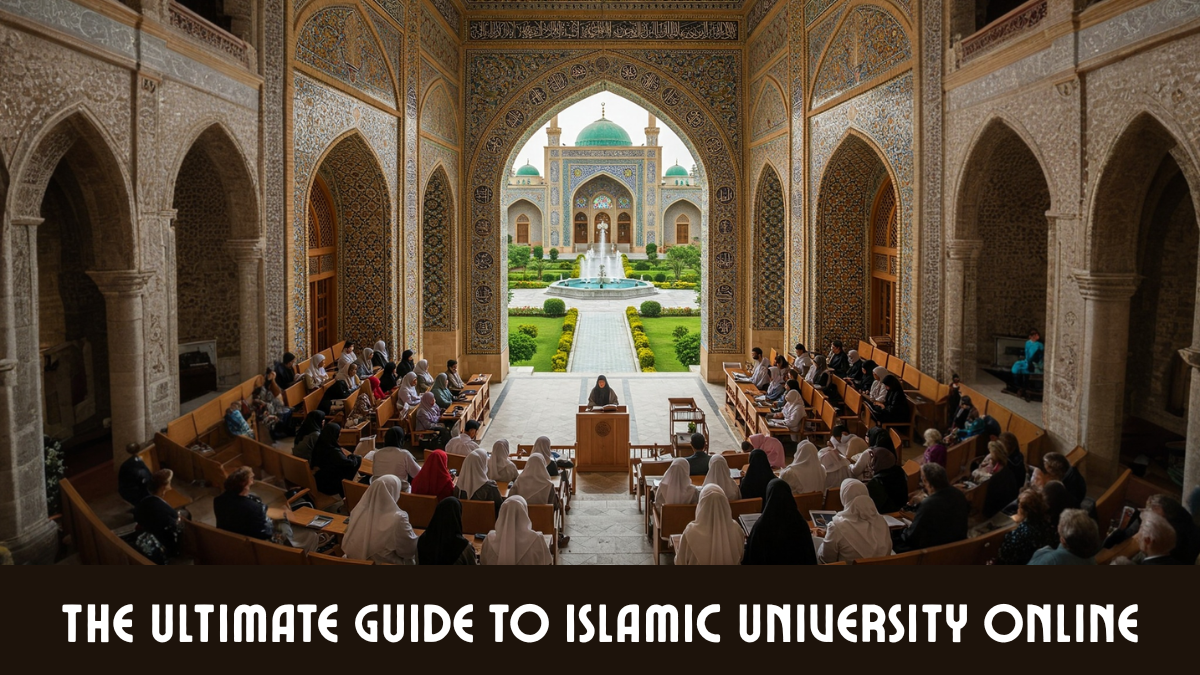In today’s fast-paced world, pursuing higher education that aligns with your faith and values is more accessible than ever, thanks to the rise of Islamic university online programs. These institutions offer a unique opportunity to combine academic excellence with Islamic principles, catering to students globally who seek flexible, faith-based learning. This comprehensive guide explores the world of Islamic university online, diving into top institutions, programs, fees, student experiences, and why these programs are a trusted choice for Muslims and non-Muslims alike. Whether you’re a working professional, a parent, or a student seeking spiritual and intellectual growth, this article provides everything you need to know to embark on your educational journey.
Introduction to Islamic University Online
The concept of an Islamic university online has transformed how students access faith-based education. These institutions deliver rigorous academic programs infused with Islamic values, allowing learners to study from anywhere in the world without compromising their beliefs. From Quranic studies to Islamic finance, online Islamic universities cater to diverse interests, offering flexible schedules that fit modern lifestyles.
The demand for Islamic university online programs has surged, driven by the need for accessible education that respects cultural and religious identities. These programs are designed to nurture scholars, professionals, and community leaders who can address global challenges with wisdom and compassion. In this guide, we’ll explore leading online Islamic universities, their offerings, costs, student feedback, and tips for choosing the right program, ensuring you have a reliable resource to make an informed decision.
Why Choose an Islamic University Online?
Benefits of Online Islamic Education
- Flexibility: Study at your own pace, balancing education with work, family, or religious commitments.
- Global Access: Connect with scholars and peers worldwide, fostering a diverse learning community.
- Faith-Based Learning: Programs integrate Islamic ethics, theology, and culture, ensuring alignment with your values.
- Affordability: Online programs often have lower tuition fees than traditional campuses, with no relocation costs.
- Career Relevance: Degrees in fields like Islamic finance, education, and technology prepare you for in-demand roles.
Who Can Benefit?
- Muslim Students: Those seeking to deepen their understanding of Islam while pursuing secular disciplines.
- Non-Muslims: Individuals interested in Islamic studies, interfaith dialogue, or ethical education.
- Working Professionals: Those looking to upskill without pausing their careers.
- Global Learners: Students in remote areas or countries with limited access to Islamic education.
Top Islamic University Online Institutions
Below is a detailed look at five leading Islamic university online institutions, known for their academic rigor, affordability, and student support. These universities have been selected based on their reputation, program diversity, and alignment with Islamic values.
1. International Open University (IOU)
- Overview: Founded by Dr. Bilal Philips, IOU is a pioneer in online Islamic education, offering accredited degrees and certificate programs.
- Programs:
- Bachelor of Arts in Islamic Studies
- Master of Arts in Islamic Studies
- Diplomas in Quranic Studies, Hadith, and Arabic Language
- Secular programs like Business Administration and Psychology with an Islamic perspective
- Tuition Fees: $100–$150 per course, with full programs ranging from $2,000–$6,000.
- Duration: 2–4 years for bachelor’s, 1–2 years for master’s.
- Eligibility: High school diploma for undergraduate programs; bachelor’s degree for postgraduate.
- Features:
- Fully online with recorded lectures and live sessions.
- Affordable fees with installment plans.
- Accreditation by the International Association for Quality Assurance in Higher Education (QAHE).
- Student Feedback: Students praise IOU’s affordability and accessibility. “IOU allowed me to study Islamic Studies while working full-time in Dubai,” says Aisha, a graduate from the UAE. Some note that self-discipline is key due to the self-paced nature.
2. The Islamic College (London)
- Overview: Based in London, The Islamic College offers online programs focusing on Islamic theology, law, and history, with a strong academic foundation.
- Programs:
- BA (Hons) in Islamic Studies
- MA in Islamic Studies
- MA in Islamic Law
- Short courses in Tafsir and Islamic Ethics
- Tuition Fees: $3,000–$5,000 per year for degree programs; short courses range from $200–$500.
- Duration: 3–4 years for bachelor’s, 1–2 years for master’s.
- Eligibility: High school diploma (A-levels or equivalent) for BA; relevant bachelor’s for MA.
- Features:
- Interactive online platform with live seminars and discussion forums.
- Collaboration with Middlesex University for degree validation.
- Emphasis on classical Islamic scholarship.
- Student Feedback: “The Islamic College’s MA program deepened my understanding of fiqh,” says Omar, a student from Canada. Some students mention occasional technical issues with the online platform but appreciate the responsive support team.
3. Mishkah Islamic University
- Overview: Mishkah focuses on Islamic sciences, offering programs that blend traditional scholarship with modern technology.
- Programs:
- Bachelor’s in Islamic Studies
- Master’s in Islamic Studies
- Certificate programs in Arabic, Aqeedah, and Seerah
- Tuition Fees: $1,500–$3,000 per year, with scholarships available.
- Duration: 3–4 years for bachelor’s, 1–2 years for master’s.
- Eligibility: High school certificate for bachelor’s; bachelor’s degree for master’s.
- Features:
- Live classes with renowned scholars.
- Affordable fees and financial aid options.
- Strong focus on community engagement and spiritual growth.
- Student Feedback: Students value the personal interaction with instructors. “Mishkah feels like a family,” says Fatima, a student from Malaysia. Some note that the course load can be intense, requiring strong time management.
4. Al Balagh Academy
- Overview: Al Balagh specializes in Islamic scholarship and professional development, offering short courses and advanced programs for scholars and professionals.
- Programs:
- Advanced Islamic Theology Program
- Islamic Finance and Banking Course
- Islamic Psychology and Counseling
- Short courses in Tafsir, Hadith, and Fiqh
- Tuition Fees: $50–$500 per course; advanced programs range from $1,000–$2,500.
- Duration: 3 months to 2 years, depending on the program.
- Eligibility: Varies by course; most require basic Islamic knowledge.
- Features:
- Flexible, self-paced learning with live Q&A sessions.
- Courses taught by globally recognized scholars.
- Focus on practical applications in modern contexts.
- Student Feedback: “Al Balagh’s Islamic finance course helped me land a job in a Sharia-compliant bank,” says Khalid, a graduate from Pakistan. Some students wish for more degree programs but appreciate the short, focused courses.
5. Madina Institute
- Overview: Madina Institute offers online programs that emphasize spiritual growth, Islamic knowledge, and community leadership.
- Programs:
- One-Year Intensive in Islamic Studies
- Certificate in Quranic Sciences
- Courses in Islamic Leadership and Dawah
- Tuition Fees: $1,000–$2,500 per program.
- Duration: 6 months to 1 year for most programs.
- Eligibility: Open to all with a passion for Islamic learning; no formal qualifications required for most courses.
- Features:
- Interactive online platform with recorded lectures.
- Emphasis on practical spirituality and community service.
- Global student base with diverse perspectives.
- Student Feedback: “Madina Institute’s program transformed my connection to the Quran,” says Zainab, a student from the US. Some students mention limited advanced degree options but value the spiritual focus.
Fees and Costs of Islamic University Online Programs
Tuition Fees Overview
Online Islamic universities are generally more affordable than traditional institutions, with no costs for housing or travel. Here’s a summary of typical fees:
- Undergraduate Programs: $1,500–$6,000 per year.
- Postgraduate Programs: $2,000–$5,000 per year.
- Certificate/Short Courses: $50–$500 per course.
- Additional Costs:
- Technology Fee: $50–$200 per semester for platform access.
- Books/Resources: $100–$300 per year (often digital).
- Exam Fees: $20–$100 per course for proctored exams.
Payment Options
- Full Payment: Due at the start of the semester or course.
- Installments: Monthly or quarterly plans with minimal fees.
- Financial Aid: Scholarships, zakat funds, or discounts for low-income students. For example, IOU offers up to 50% tuition waivers, while Mishkah provides need-based grants.
- Free Courses: Some institutions, like Al Balagh, offer free introductory courses to attract students.
Comparison Table
| Institution | Program Cost (USD) | Scholarships Available | Payment Plans |
|---|---|---|---|
| International Open University | $2,000–$6,000/year | Yes | Yes |
| The Islamic College | $3,000–$5,000/year | Limited | Yes |
| Mishkah Islamic University | $1,500–$3,000/year | Yes | Yes |
| Al Balagh Academy | $50–$2,500/course | Yes | Yes |
| Madina Institute | $1,000–$2,500/program | Yes | Yes |
Admission Process and Requirements
General Requirements
- Undergraduate Programs: High school diploma or equivalent; TOEFL/IELTS for non-English speakers (e.g., IOU requires TOEFL 80 or IELTS 6.0).
- Postgraduate Programs: Bachelor’s degree in a relevant field; some require work experience or a statement of purpose.
- Certificate Courses: Open to all, with basic Islamic knowledge preferred for advanced courses.
- Application Fees: $10–$100, depending on the institution. Some, like Madina Institute, waive fees for certificate programs.
Application Process
- Online Application: Submit via the university’s website, including personal details and academic records.
- Documents: Transcripts, ID, recommendation letters (for postgraduate), and a personal statement.
- Interview/Assessment: Some programs, like The Islamic College’s MA, require an online interview.
- Technical Requirements: Reliable internet, a computer, and familiarity with platforms like Zoom or Moodle.
- Deadlines: Rolling admissions for most programs, with specific deadlines for degree programs (e.g., IOU’s fall intake closes in August).
Student Life in an Islamic University Online
While online learning lacks a physical campus, Islamic university online programs foster a strong sense of community through:
- Virtual Study Circles: Weekly halaqas for Quranic reflection and spiritual growth.
- Discussion Forums: Platforms like Moodle or WhatsApp groups for peer interaction.
- Live Q&A Sessions: Direct access to scholars for personalized guidance.
- Community Events: Online Ramadan programs, Eid celebrations, and webinars with guest speakers.
- Student Support: Academic advisors, technical support, and counseling services to ensure success.
Students often describe the experience as “a global classroom” where they connect with peers from diverse backgrounds, from Nigeria to Indonesia, united by a shared commitment to faith.
Student Reviews and Experiences
What Students Say
- International Open University: “IOU’s affordability made it possible for me to earn a degree without debt,” says Ahmed, a student from Egypt. Some mention the need for better live interaction but value the recorded lectures.
- The Islamic College: “The MA in Islamic Law was challenging but rewarding,” says Sarah, a UK-based student. Technical glitches are a minor complaint, offset by strong faculty support.
- Mishkah Islamic University: “The live classes feel like sitting with a scholar in person,” says Noor, a student from Australia. Some note the intense workload but appreciate the spiritual focus.
- Al Balagh Academy: “The Islamic psychology course was practical and eye-opening,” says Amina, a counselor from India. Students wish for more degree options but love the short courses.
- Madina Institute: “The intensive program strengthened my faith,” says Yusuf, a US student. Limited advanced programs are a drawback, but the spiritual emphasis is a highlight.
Ratings
- Overall Satisfaction: 4.0–4.5/5 across platforms like Trustpilot and educational forums.
- Affordability: 4.5/5, with IOU and Mishkah rated highest.
- Academic Quality: 4.2/5, with The Islamic College praised for rigor.
- Student Support: 4.0/5, with Al Balagh and Madina Institute noted for responsiveness.
Challenges
- Self-Discipline: Online learning requires strong time management, as noted by IOU students.
- Technical Issues: Occasional platform glitches, reported by The Islamic College users.
- Recognition: Some employers may question online degrees, though accreditation (e.g., IOU’s QAHE) addresses this.
Why Islamic University Online Is a Trusted Choice
These institutions earn trust through:
- Expert Faculty: Scholars with advanced degrees and deep Islamic knowledge, like Dr. Bilal Philips at IOU.
- Accreditation: Recognition by bodies like QAHE (IOU) or university partnerships (The Islamic College with Middlesex).
- Transparency: Clear fees, admission processes, and program details on official websites.
- Positive Feedback: High student satisfaction and alumni success in fields like Islamic finance and education.
- Community Impact: Graduates lead mosques, teach in schools, and work in ethical industries, reflecting the programs’ real-world value.
Career Opportunities and Alumni Success
Graduates of Islamic university online programs excel in diverse fields:
- Islamic Finance: Roles in Sharia-compliant banks and investment firms.
- Education: Teaching in Islamic schools or online platforms.
- Community Leadership: Imams, youth counselors, and NGO workers.
- Counseling: Islamic psychology graduates support mental health in Muslim communities.
- Dawah: Graduates lead outreach programs to promote interfaith understanding.
Career services, like IOU’s job boards and Al Balagh’s networking events, connect students with opportunities. Notable alumni include:
- Dr. Fatima Azhar: IOU graduate, now a lecturer in Islamic Studies in Malaysia.
- Bilal Khan: Al Balagh alumnus, working in Islamic finance in Dubai.
Tips for Choosing the Right Islamic University Online
- Define Your Goals: Want a degree or short course? Interested in Islamic studies or a secular field with an Islamic perspective?
- Check Accreditation: Ensure the program is recognized for career or further study purposes.
- Compare Fees: Look for scholarships or zakat funds to reduce costs.
- Read Reviews: Check student feedback on platforms like Trustpilot or Reddit.
- Assess Flexibility: Choose a program that fits your schedule, whether self-paced (IOU) or live (Mishkah).
- Contact Admissions: Ask about course structure, faculty, and support to ensure a good fit.
Similar Post: Comprehensive Guide to the Islamic University of New York: Your Path to Faith-Based Education
Conclusion
An Islamic university online offers a powerful way to pursue education that honors your faith while preparing you for a successful career. Institutions like the International Open University, The Islamic College, Mishkah Islamic University, Al Balagh Academy, and Madina Institute provide affordable, flexible, and high-quality programs that cater to diverse needs. With transparent fees, strong student support, and a global community, these universities empower learners to grow intellectually and spiritually.
Whether you’re deepening your knowledge of Islam or seeking a career in finance, education, or counseling, an Islamic university online is a trusted path to achieve your goals. Visit the websites of these institutions, explore their programs, and take the first step toward a transformative educational journey.














Post Comment